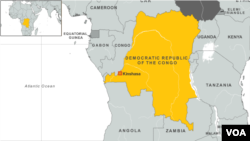The United Nations said Wednesday that human rights violations by authorities in the Democratic Republic of Congo were escalating ahead of a round of elections during which President Joseph Kabila is set to step down.
The U.N. Joint Human Rights Office (UNJHRO) documented 24 election-related violations in August, including arbitrary arrests and threats, compared with 14 such incidents in July, said the director of the office, Jose Maria Aranaz.
Journalists were targeted in eight cases, while the same number involved activists, the U.N. body said, without giving details on the remainder.
"This has a negative impact on the credibility of elections ... and it confirms a worrying trend," Aranaz told Reuters after a news conference. "The UNJHRO remains deeply concerned about the restrictions on liberty of expression in the country and the security of those who express criticisms of the government and its actions."
Political tensions in the DRC are rising before local, provincial and national elections over the next 14 months, meant to culminate in a presidential vote in November 2016.
Kabila, who took power after his father's assassination in 2001, is required by the constitution to stand down, but critics accuse him of trying to hold on to power. At least 40 people were killed in anti-government protests in January.
Kabila has refused to comment on his political future, although a spokesman has said he intends to respect the constitution.
Aranaz said he was alarmed by abuses by Congo's intelligence agency, which was responsible for nine of the 24 violations.
Domestic and international rights groups have accused the government of using the intelligence service to jail and intimidate political opponents and young activists.
Four young activists in Goma could be sentenced to three years each in prison on Friday. They were arrested in April for encouraging local residents to protest the detentions of fellow activists.
The government did not comment on the U.N. statement but has previously said that law enforcement targets only lawbreakers and that no arrests are politically motivated.





